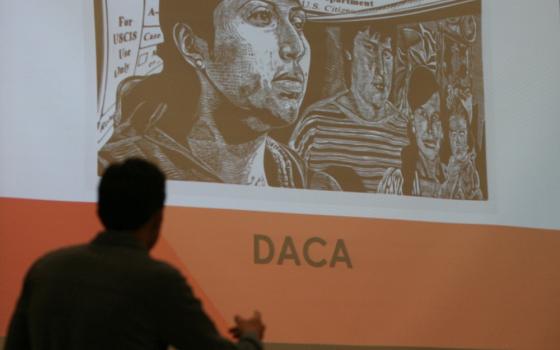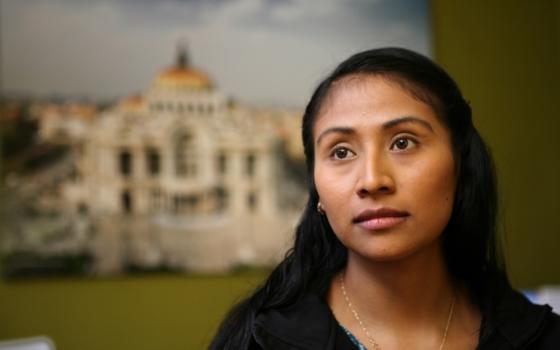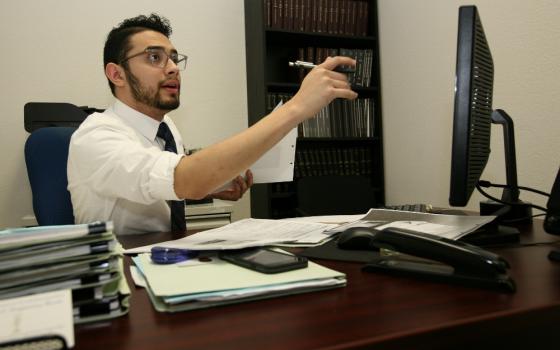Areli Zarate has big dreams. She loves her job as a teacher in Austin, Texas, and speaks of people at work as if they're family. Yet she hesitates when asked about her future because she doesn't know what to say.
"I just want to teach," she says nodding her head emphatically. "I don't see doing anything else than being in the classroom."
Zarate, 25, is one of 741,546 undocumented immigrants in the Deferred Action for Childhood Arrivals program, created by President Barack Obama through executive action in 2012. Dubbed "dreamers," DACA applicants who meet strict government requirements are awarded a work permit that is renewable every two years. It is not a path to citizenship but merely protects permit holders from deportation. "Dreamers" now face an uncertain future after Donald Trump's election because a central tenet of his campaign was revoking Obama's executive actions.
Like many DACA applicants, Zarate came out of the shadows and applied for the program in 2012. The second of five children, she came to the U.S. when she was 8 years old. Four siblings also have DACA permits, while the youngest is an American citizen. Her parents remain undocumented, she said, and the fear of deportation is always there.
She relives the night her future changed. "I didn't want to see it [election results], but I had to, so I opened my Facebook and saw through all my friends' comments who was gonna be the new president, and I just couldn't stop crying," Zarate said.
The next day, she listened to callers pour their hearts out on a Spanish-language radio station as she drove to her job at Austin High School in tears. "I didn't consider not going to school that day, because I knew it was my responsibility to be there for my students."
At school, she became the comforter. "They were crying because they are citizens but most of their parents are immigrants," she said. "Some of them didn't understand why their parents were crying in the morning."
If her worst fears come true and DACA ends, Zarate would have to stop teaching Spanish and give up a class dedicated to first-generation students to close achievement gaps and prepare them for college. "I want to be able to finish with that class and be able to be with them [students] when they graduate, when they apply for college," Zarate said. "Their dreams are my dreams."
Among the requirements for DACA applicants is they must have arrived in the U.S. before turning 16, been under the age of 31 as of June 15, 2012, and not been convicted of a felony or serious misdemeanor and not pose a national security threat, according to the U.S. Citizenship and Immigration Services website. In addition, there are education and other requirements.
Although Zarate was approved for a work permit, turning in personal information on the application form came with a price.
"The fear is that in that process, since the government now has the information, knowing the applicants are undocumented, that they could send everyone into deportation proceedings," said Elissa Steglich, clinical professor at the University of Texas Law School Immigration Clinic.
Enrique Chavira, 25, is one DACA recipient who saw his law school dreams evaporate when he couldn't get financial aid because of his legal status. He now helps other immigrants attain legal status by working as a legal assistant for an immigration attorney. It's as close as he can get to practicing law.
"I am scared I could lose everything I've worked for; I am scared I could never go back to law school."
He admitted he doesn't know much about the country he left 19 years ago and wonders if he could even find work there in Mexico. "The rational side of me says, 'You don't know what they're going to do, so don't even worry about that right now,'" Chavira said. "They might deport me, but if they do deport me what am I going to do once I get there?"
"If everything that Trump says he wanted to do when he was on the campaign trail and since the election actually happens," Steglich said, "we will see almost three quarters of a million DACA holders lose that ability to work, to study, to participate in communities to the extent that they are."
These are kids who grew up in the U.S., "who are job creators, who are home owners, who are just integral parts to our communities," Steglich said. "We would suffer a tremendous loss, even just to have their ability to legally work and travel taken away."
More than 100 Catholic college and university presidents signed a statement, released by the Association of Catholic Colleges and Universities, pledging support of undocumented students. It said, in part: "We express hope that the students in our communities who have qualified for DACA are able to continue their studies without interruption and that many more students in their situation will be welcome to contribute their talents to our campuses."
While DACA applicants are at risk for deportation, legal experts believe they would be low priority. To be on the safe side, most immigration attorneys and legal services non-profits are advising DACA applicants not to file new applications.
Some experts note that deportation proceedings would take place in immigration court, which already has such a huge backlog that many hearings are years away.
Once in office, Trump could let the DACA program continue, stop it and let current work permits expire, or shut it down and revoke the permits, said Jeanne Atkinson, the executive director of CLINIC, the Catholic Legal Immigration Network Inc. Her organization supports some 300 networks that provide legal services for immigrants around the country.
In a TIME magazine cover story released Wednesday, Trump appeared to soften his stance on DACA applicants.
In McAllen, Texas, where "Dreamers" benefit from working with ARISE , an organization in the Rio Grande Valley that assists documented and undocumented immigrants, Sr. Rose Weidenbenner discussed how they have reacted to possible changes.
They are not quite fearful, said Weidenbenner, a Sister of Mercy and social worker who provides administrative support at ARISE, but people she serves are confused. "It's like, 'What's going to happen? Are we going to have to start over again?'"
Despite the uncertainty, Zarate is undeterred and has vowed to stand up for her community.
At a recent press conference at the Mexican consul's office in Austin, she was introduced to members of the press and made herself available for interviews.
"There is a lot of fear in the community, of wanting to stay in the shadows, but we have to speak up, and we have to be heard," Zarate said. "There are a lot of people fighting for us and I just want to thank them."
[Global Sisters Report staff writers Soli Salgado and Dan Stockman contributed to this report. Nuri Vallbona is a freelance documentary photojournalist. She worked for the Miami Herald from 1993 to 2008 and has been a lecturer at the University of Texas and Texas Tech University]
Related - Immigrants, advocates fortify resources after Trump election



